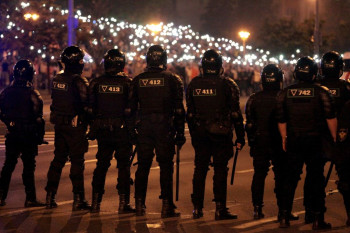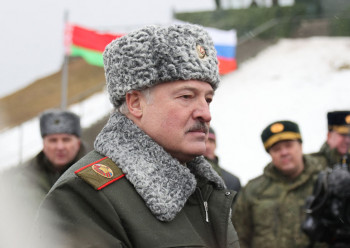Belarus Weekly: Russia continues to use Belarus as a launchpad for its missile strikes, Kyiv continues to bolster its border defenses

This week marks the second anniversary of Belarusian dictator Alexander Lukashenko proclaiming himself president for the sixth consecutive term in an election deemed as neither free nor fair.
Weeks after the fraudulent count, Lukashenko proceeded to brutally crush the nation’s attempt at popular upheaval, turning Belarus into a very grim place.
Two years in, Russia continues to use Belarus as a launchpad for its missile strikes against Ukraine. As a result, Kyiv continues to bolster its border defenses anticipating a potential offensive from Belarus.
Meanwhile, Belarus sends soldiers to participate in a Russian-led military drill.
Ukraine’s government terminates the agreement between Kyiv and Minsk’s law enforcement as Belarus labels Ukrainian Presidential Advisor Oleksiy Arestovich an “extremist.”
Belarus’ opposition leader Sviatlana Tsikhanouskaya announces the creation of a “United Transitional Cabinet” aimed at safeguarding the country’s future independence and sovereignty.
State-led repressions continue as Belarus’ police publish the regime’s list of alleged “extremists” and crack down on activists, journalists, and political opposition.
Russia moves more rockets, air defense systems to Belarus
On Aug. 7, the General Staff of Ukraine’s Armed Forces reported that Russia was deploying more troops and air defense systems to Belarus.
Activists from the Belarusian Hajun monitoring watchdog report an increased supply of Russian rockets in Belarus. The Russian IL-76 plane arrived three times over the past three days and most likely delivered the S-300/400 rockets.
The watchdog suggests that this can signal ongoing preparations for missile attacks against Ukraine from multiple locations in Belarus.
On Aug. 9, the Belarusian Ministry of Defense released a statement on the launch of sudden drills involving the country’s air force and air defense. The drills are taking place in Belarus from Aug. 9 to Aug. 11 and then are moved to Russia in late August.
The exact number of troops taking part in this activity is undisclosed.
Explosions reported at a Belarus airfield
The monitoring project Belarusian Hajun reported several explosions at the Ziabrauka airfield, located in Belarusian Gomel Oblast that is bordering Ukraine's Chernihiv Oblast, overnight on Aug. 11.
Belarusian Hajun said there were “at least eight flashes” seen starting from 12:30 a.m.
Franak Viacorka, the advisor to the leader of the Belarusian opposition Sviatlana Tsikhanouskaya, also said that at least eight explosions took place near the airfield, which is “used by Russian aviation in the war against Ukraine.
”However, Belarusian Defense Ministry later said that one of their pieces of equipment caught fire during new engine testing at 11 p.m. on Aug. 10.
Earlier on Aug. 9, Belarus announced renewed joint military drills with Russia that were scheduled to take place in Belarus from Aug. 9-11, and in Russia from Aug. 22-25.
“So far, there is no confirmation if these explosions are connected to any military drills conducted by the Russian and Belarus armies on Belarus territory,” Viacorka said.
Ukraine prepares for a potential Belarus offensive
Ukraine’s northern Volyn and Rivne oblasts, which border Belarus, are reportedly preparing for yet another potential offensive from Belarus’ territory.
Rivne Oblast’s Military Administration announced the development of an evacuation plan for civilians in case of an attack. Meanwhile, Volyn Oblast’s territorial defense has reportedly mined the border with Belarus.
While experts currently suggest that the direct involvement of Belarus’ military in Russia’s full-scale war remains unlikely and Russia lacks troops to relaunch a northern campaign, regional heads of the oblasts bordering Belarus say they are preparing for all possible scenarios.
Belarusian army to dispatch soldiers for drills in Russia
Belarus’ Defense Ministry will send over 250 servicemen to Russia to participate in military training exercises.
The Vostok 2022 strategic command and staff exercise will reportedly take place at training grounds in eastern Russia from Aug. 30 to Sept. 5 under the supervision of Valery Gerasimov, Chief of the General Staff of the Russian Armed Forces.
Belarus is also preparing to participate in the 2022 International Army Games, joined by Azerbaijan, Algeria, Armenia, Belarus, Venezuela, Vietnam, Iran, India, Kazakhstan, China, Russia, and Uzbekistan
Sviatlana Tsikhanouskaya establishes ‘United Transitional Cabinet’
On Aug. 9, the second anniversary of the 2020 fraudulent presidential election which triggered nationwide protests. Belarusian opposition leader Sviatlana Tsikhanouskaya announced the creation of a “United Transitional Cabinet,” a collective executive body aimed at safeguarding Belarus’ potential future independence and sovereignty.
According to Tsikhanouskaya, the body will attempt to “restore constitutional law and order, ensure the transition of power from dictatorship to democracy, and create conditions for holding fair and free elections.”
The United Transitional Cabinet will consist of four members, with their term limited to six months.
The four members are Pavel Latushka, a former Belarusian politician, Aliaksandr Azarau, a representative of BYPOL, an association of exiled former Belarusian law enforcement officers, Valery Kavaleuski, Tsikhanouskaya’s foreign affairs representative, and Valery Sakhashchyk, an exiled Belarusian military officer.
Additional representatives will reportedly be announced soon.
Belarusian court deems Ukraine’s top aide Arestovich – ‘extremist’
A court in Minsk dubbed the social media of Ukraine’s Presidential Advisor Oleksiy Arestovich “extremist” on July 27.
The list of social media platforms includes Arestovich’s YouTube, Instagram, Facebook, and Telegram accounts.
Effective immediately, the decision renders it illegal, and thereby punishable for Belarusians to subscribe, share, or store the content shared on his channels.

A couple rides a scooter in front of the riot police during a protest of opposition supporters triggered by election fraud, in Minsk, on Aug. 9, 2020. (SERGEI GAPON/AFP via Getty Images)
Belarus sentences five people to up to 16 years in prison for sabotaging rail traffic
On Aug. 10, five Belarusian nationals were sentenced to over 15 years in prison for “terrorism.” According to the court, they sabotaged Belarus' railway network in 2021 in protest of the fraudulent 2020 presidential election.
The male defendants, Kanstantsin Yermalovich, Vital Minkevich, and Ihar Kazlou, were sentenced to 14-16 years in prison. The female defendants, Natallia Ked and Nadzeya Polkina will now spend two years in prison and two years on house arrest.
Acts and attempted acts of terrorism are punishable by death in Belarus.
Since the beginning of Russia’s full-scale war against Ukraine, 60 individuals have been detained on charges of participating in Belarusian railway network interference set to help Ukraine slow Russian advances.
Ukraine terminates agreement on law enforcement cooperation with Belarus
Ukraine’s government announced the termination of an agreement between Ukraine and Belarus’ interior ministries regarding law enforcement cooperation on Aug. 9.
The agreement originally pertained to cooperation between the two states on crime prevention, maintaining public order, extradition, and information about those attempting to evade payments or lawsuits.
The announcement is welcomed by Belarusian political activists residing in Ukraine, whose fates may have previously been subject to the agreement’s stipulations.
Belarus’ Police reveal the number of ‘extremists’
In an interview with Belarusian state-controlled media, Deputy Head of Belarus’ Interior Ministry’s Main Directorate for Combating Organized Crime and Corruption, Mikhail Bedunkevich, revealed the number of individuals and entities recognized as “extremists” in Belarus.
According to Bedunkevich, 58 groups have been dubbed “extremist organizations,” 448 individuals have been listed as being involved in “extremist activities,” and 370 online media sites have been recognized as spreading “extremist material” since 2021.
He added that over 79% of those listed reside abroad.
The country’s police have also reportedly identified 160 individuals responsible for “extremist” Telegram channels and 100 individuals allegedly involved in an initiative led by BYPOL to coordinate anti-regime protests.
The recognition and prosecution of individuals and entities deemed “extremist” has become an effective tool of repression for Lukashenko’s regime aimed at silencing independent information sources and stifling the coordination of anti-government movements.
Belarusian authorities sentence journalist to jail for ‘extremism’
Iryna Slaunikava, a Belarusian journalist with Belarus-focused Polish TV channel Belsat, was sentenced to five years for allegedly creating an “extremist organization” and “gross violation of public order” in a closed trial on Aug. 3.
While the prosecution requested a sentence of four years, Slaunikava was instead given five years by the presiding judge, who notably adjudicated former political opposition leader Siarhei Tsikhanouski’s trial.
When Slaunikava was detained in October 2021, Belsat was not recognized by Belarus as an “extremist organization.”
Polish Prime Minister Mateusz Morawiecki said the verdict is an “absolute scandal, a violation of all civilizational norms, human rights, and journalistic standards.” Morawiecki stated that Poland will respond at the highest level.
The Polish Foreign Affairs Ministry summoned a Belarusian chargé d’affaires in Poland to condemn Slaunikava’s verdict.
According to the Belarusian Association of Journalists, around 32 Belarusian journalists have been imprisoned and around 400 have reportedly left the country thus far.













